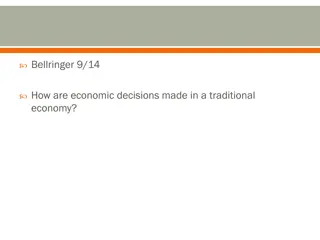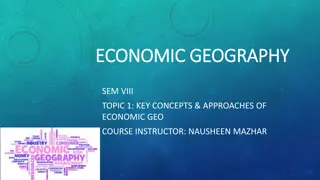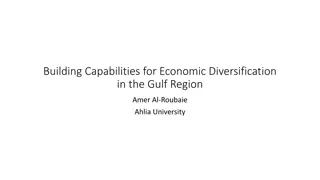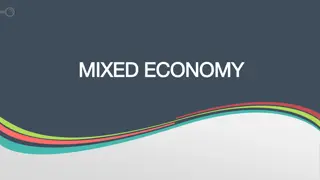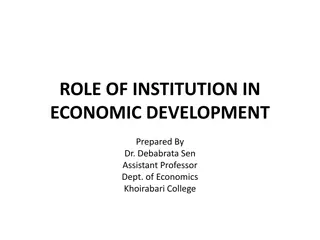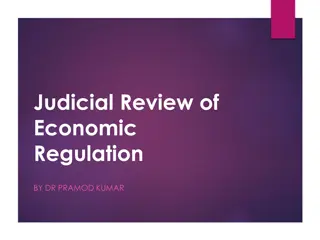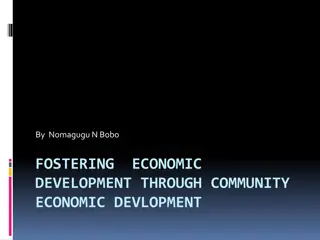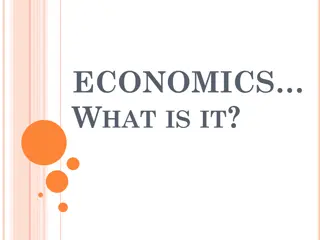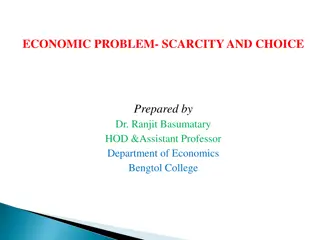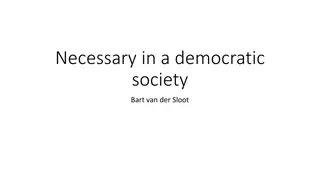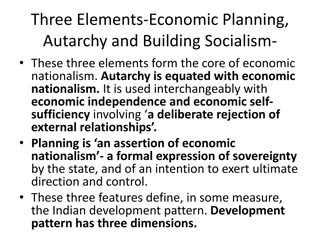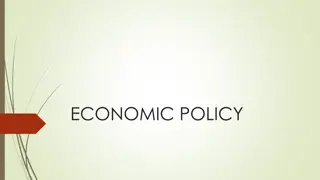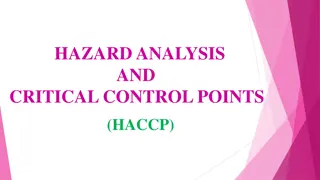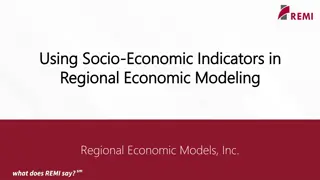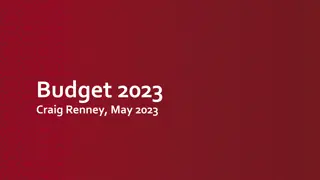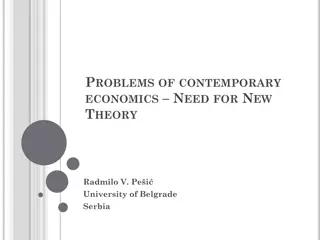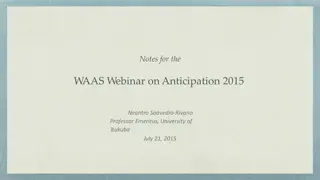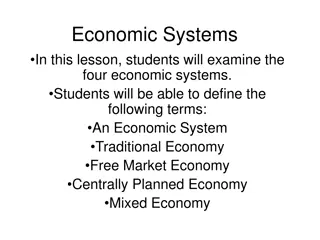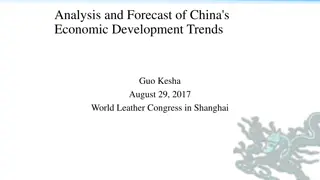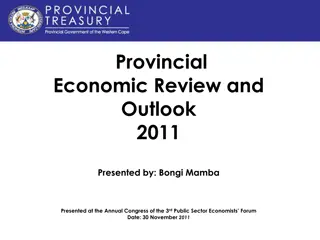2023/24 Annual Performance Plan Presentation for Small Business Development Department
The presentation outlines the 2023/24 Annual Performance Plan of the Department of Small Business Development, covering situational analysis, global economic outlook, performance priorities, game-changers program, alignment with economic recovery plans, institutional program performance, key risks a
27 views • 59 slides
U.S. Virgin Islands Economic Development Authority Webinar: Small Business COVID-19 Resources
The U.S. Virgin Islands Economic Development Authority held a webinar focused on providing resources and assistance for small businesses impacted by COVID-19. The agenda covered the overall economic impact, reliable resources, SBA Economic Injury Disaster Loan (EIDL), and the tourism industry. Speak
0 views • 13 slides
Understanding Medically Necessary Ambulance Transport Guidelines
This comprehensive guide discusses the importance of medical necessity for ambulance transfers, criteria for determining when ambulance transport is required, and the impact on patients and healthcare facilities. It covers types of ambulance transports, roles of physicians in evaluation, and the nec
0 views • 12 slides
Economic Systems in the United Kingdom, Germany, and Russia
Economic decisions in traditional economies are based on customs and beliefs. The United Kingdom has a mixed market economy with a focus on service industries, while Germany's economy is export-based. Russia's economy leans towards a command system. By comparing these economic systems, one can see h
0 views • 11 slides
Using the Five Case Model for Effective Business Case Development
The Five Case Model (5CM) is a framework used to assess projects from various perspectives to ensure strategic necessity, economic and social desirability, commercial viability, affordability, and practical deliverability. This model strengthens project scoping, planning, risk assessment, and benefi
0 views • 26 slides
Understanding Key Concepts in Economic Geography
Economic Geography is a sub-discipline that utilizes a geographical approach to analyze the spatial distribution of economic activities at various scales. It focuses on the location of economic activities and their relationship with the environment, encompassing primary, secondary, and tertiary sect
1 views • 20 slides
Enhancing Economic Diversification in the Gulf Region
Economic diversification in the Gulf region is crucial for sustainable growth and development. Productive capacities, defined as the resources and capabilities enabling countries to produce goods and services, play a key role. Economic diversification involves shifting towards a varied structure of
0 views • 13 slides
Understanding Mixed Economy: A Balanced Economic Model
Mixed economy combines elements of socialism and capitalism, allowing both public and private sectors to coexist. Government intervention aims to achieve a balance between individual initiatives and societal goals, promoting economic development while addressing inequalities. Features include econom
0 views • 15 slides
Role of Institutions in Economic Development: A Comprehensive Analysis
Understanding the significance of institutions in economic development is crucial, as they play a pivotal role in shaping societal, political, and economic relations. Institutions, defined as established customs or practices, act as the rules of the game that structure human interactions. Their qual
0 views • 13 slides
Economic Perspectives on Malaria Control and Elimination
Analyzing malaria control and elimination from an economic standpoint is crucial for understanding the long-term health outcomes, cost savings, operational strategies, funding gaps, and wider economic consequences of the disease. By examining the correlation between malaria and poverty, exploring fu
4 views • 21 slides
Understanding Economic Systems and Their Impacts
Explore traditional, command, and market economies, and how they address economic questions. Understand the concept of mixed economies and their placement on a continuum between market and command systems. Compare economic systems in Israel, Saudi Arabia, and Turkey. Delve into essential economic vo
0 views • 17 slides
Data Room at Banco de Mexico: Enhancing Data Sharing for Economic Research
Banco de Mexico has been gathering granular data on financial transactions since the mid-1990s to monitor compliance, risks, and economic interactions. The creation of a Data Room allows for efficient and secure data sharing, contributing to economic research and analysis. The Economic Microdata Lab
3 views • 12 slides
Judicial Review of Economic Regulation: A Case Study
Courts have limited scope in reviewing economic policy matters unless decisions are arbitrary, mala fide, or violate laws. A recent case involving the Small Scale Industrial Manufacturers Association vs. Union of India showcases the challenges of judicial review in economic distress situations cause
0 views • 15 slides
Economic Impact of COVID-19 Pandemic on Business in Rwanda: VAR Model Analysis
The study investigates the effects of COVID-19 on business start-ups, money supply, lending interest rates, international trade, savings, investments, and economic growth in Rwanda using a VAR model. The research highlights the changes in economic activities due to the pandemic and explores the impa
0 views • 10 slides
Fostering Economic Development Through Community Economic Development
Community Economic Development (CED) involves local actions to create economic opportunities improving social conditions, especially for the disadvantaged. It recognizes the interdependence of economic, environmental, and social challenges, emphasizing solutions rooted in local knowledge. The ultima
1 views • 30 slides
Understanding Irish Economic History Since Independence
This topic delves into the economic evolution of Ireland since gaining independence, exploring key milestones such as shifts from globalization to autarky, and from autarky to globalization. It also discusses the economic structures of different decades, offering a comprehensive view of Ireland's ec
1 views • 44 slides
Understanding Economic Systems and Questions
Explore the concepts of traditional, command, and market economies, and how they answer key economic questions. Learn about economic systems in Canada, Cuba, and Brazil, and grasp the fundamental economic questions of what to produce, how to produce, and for whom to produce. Understand the basics of
0 views • 26 slides
Understanding the Economic Problem: Scarcity and Choice
The economic problem arises from the scarcity of resources relative to unlimited wants, leading to the necessity of making choices. This results in the central questions of what to produce, how to produce, and for whom to produce, which are inherent in every economy. Decision-making processes involv
0 views • 7 slides
Supporters of Slavery in the 19th Century: Legal, Religious, and Economic Arguments
In the 19th century, defenders of slavery utilized legal arguments by denying citizenship rights to blacks, religious arguments by justifying ownership and guidance through biblical references, and economic arguments by comparing treatment of slaves in the South to conditions of workers in the North
0 views • 4 slides
Excised Biopsy Tract Histology for Primary Bone Tumours: Necessity of Excision Examined
Investigating the necessity of excising biopsy tracts in primary bone tumours, this study analyzed 278 patients over a span of two years. Findings indicated conflicting evidence regarding the risk of malignant seeding in biopsy tracts, with only one patient showing histological evidence of seeding.
0 views • 14 slides
Necessity Test in a Democratic Society: Balancing Public vs Private Interests
The necessity test in a democratic society involves balancing public interests such as security, morality, and environment against private interests. The test determines whether an infringement is necessary and legitimate, or unnecessary and a violation. Different categories like security-related ca
0 views • 36 slides
Exploring Collateral Laws in SME Finance for Economic Growth
Analyzing the impact of collateral laws on SME finance and sectoral activity, Calomiris et al.'s paper discusses the significance of movable versus immovable collateral and the potential distortions in economic and financial activities. The study evaluates the role of governmental intervention and e
0 views • 10 slides
Enhancing Economic Statistics in Asia-Pacific Region
The Regional Programme on Economic Statistics aims to improve economic statistics in the Asia-Pacific region by enhancing capacity and coordination among National Statistical Offices (NSOs) and other stakeholders. The programme focuses on implementing the Core Set of Economic Statistics to facilitat
0 views • 11 slides
Understanding Australia's Economic Development and History
Explore the economic future of Australia through units focusing on financial literacy, government structure, historical context, and current affairs. Dive into key concepts such as small business initiatives, taxation, colonial history, and governmental systems, all contributing to shaping Australia
0 views • 35 slides
Economic Nationalism and Development Pattern in India
Economic nationalism in India was characterized by the elements of economic planning, autarchy, and socialism. The development pattern focused on capital goods industries, inward orientation, and state ownership. Two interpretations of this pattern were influenced by economic theory and Marxist pers
0 views • 13 slides
Overview of Economic Policy: From Mercantilism to Present-Day Practices
Explore the concept of economic policy and its importance in achieving economic objectives. Delve into the historical debate on state intervention in the economy and major schools of economic theory like Mercantilism. Understand the emergence of economic policies through economic, political, scienti
0 views • 105 slides
Understanding HACCP Terminology and Necessity
Hazard Analysis and Critical Control Points (HACCP) play a crucial role in ensuring food safety. This article emphasizes the necessity of HACCP, outlines key terminology such as hazards, contamination, control measures, critical control points, and provides insights into HACCP plan, risk assessment,
0 views • 18 slides
Understanding Modal Verbs in English
Modal verbs in English such as 'must', 'have to', 'mustn't', and 'don't have to' are used to express obligations, prohibitions, and lack of necessity. 'Must' and 'have to' convey internal and external obligations, while 'mustn't' indicates prohibition and 'don't have to' implies lack of necessity. E
0 views • 14 slides
Importance of Economics Education for a Free Society
The importance of economics education in maintaining a free society is emphasized through historical quotes, current challenges, and efforts to promote economic literacy. The lack of economic knowledge among the public is highlighted as a significant issue that needs addressing. Initiatives such as
0 views • 18 slides
Economic Analysis of a Country's Economy over the Last 20 Years
Exploring a country's economy over the last two decades involves analyzing its main industries, export products, economic growth rate, unemployment rate, inflation rate, current interest rate, and GDP per sector. Understanding these factors can provide insights into the country's economic strengths
0 views • 8 slides
Analyzing Socio-Economic Indicators in Regional Economic Modeling
Analysts utilize regional macroeconomic models to assess the impact of policies on various economic factors including employment, income distribution, and workforce demographics. REMI-SEI framework focuses on understanding the distributional effects of regional economic policies to offer broad-based
0 views • 32 slides
Budget 2023 Summary: Political, Economic, and Fiscal Highlights
The Budget 2023 by Craig Renney in May covers a range of critical areas including Political Background, Economic Outlook, Fiscal Outlook, and Spending Highlights. It reflects the challenges faced by the government amidst an impending election and economic uncertainties. The economic forecast is more
0 views • 11 slides
Challenges and the Need for New Economic Theory in Contemporary Economics
The discussion highlights the shortcomings of mainstream economics and the necessity for a new economic theory that aligns with real-world scenarios. It emphasizes the importance of economics knowledge in promoting survival, growth, and sustainable prosperity, while also addressing issues such as pe
0 views • 11 slides
Anticipatory Approach to Economic Theory - Highlights and Critiques
Critiques of conventional economic thinking include its ahistorical approach, lack of focus on social issues, and uniform policy recipes. An alternative, anticipatory approach to economic theory emphasizes the role of uncertainty in driving change and transforming economic institutions. It explores
0 views • 6 slides
Understanding Scarcity in Economics: A Tutorial Overview
Explore the concept of scarcity in economics through a comprehensive tutorial covering key principles such as resource allocation, human wants, economic problems, and the necessity of economic analysis due to limited resources. Gain insights into the art and science of economic analysis in relation
0 views • 42 slides
Understanding Economic Systems: An Overview
Explore the four economic systems - Traditional, Free Market, Centrally Planned, and Mixed Economies. Learn how societies produce and distribute goods and services and address key economic questions. Discover the differences between economic systems and the importance of answering key economic quest
0 views • 15 slides
Analysis and Forecast of China's Economic Development Trends - Guo Kesha Presentation
The presentation by Guo Kesha at the World Leather Congress in Shanghai delves into the analysis and forecast of China's economic development trends. It discusses whether a new cycle has opened for the Chinese economy, the potential for an L-type growth platform, and initial research on economic tre
0 views • 22 slides
Economic Review and Outlook 2011: Global Trends and Regional Impacts
The Provincial Economic Review and Outlook for 2011 highlighted the global economic performance and outlook, focusing on factors like GDP growth, employment trends, and socio-economic conditions in the Western Cape region. It discussed the recovery in global economic growth post-2009, with the IMF p
0 views • 29 slides
Importance of Inclusive Economic Growth and Governance in Rwanda
Inclusive economic growth is crucial as it offers economic opportunities and equal access, enhancing poverty reduction efforts. Societies thrive when based on equality, promoting better development outcomes. The qualities of government for economic growth encompass economic liberalism, democratic pa
0 views • 28 slides
Developing Brief Economic Commentaries for Cochrane Intervention Reviews
End-user decisions benefit from the inclusion of economic perspectives in Cochrane Intervention Reviews (CIRs). This summary explores the importance of incorporating economic evidence to enhance the applicability of reviews, without substantial additional resource burden. Topics covered include cost
0 views • 40 slides



